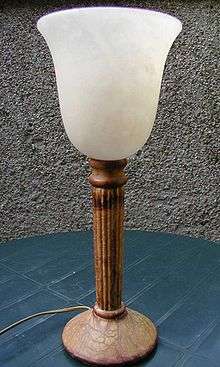alabaster
English

Alternative forms
- alabastre (obsolete)
- alablaster (obsolete)
Etymology
Borrowed from Old French alabastre, from Latin alabaster (“box for perfume made of alabaster”), from Ancient Greek ἀλάβαστρος (alábastros), from earlier ἀλάβαστος (alábastos, “vase made of alabaster”). This may further derive from Egyptian ꜥj-r-bꜣstjt (“vessel of the Egyptian goddess Bast”). The Latin suffix -aster is unrelated, but may have influenced the spelling of the borrowing from Ancient Greek (whence a direct loan could have been rendered as *alabastrus).
Pronunciation
Noun
alabaster (usually uncountable, plural alabasters)
- A fine-grained white or lightly-tinted variety of gypsum, used ornamentally.
- c. 1596, William Shakespeare, The Merchant of Venice, Act I, Scene I, lines 89-90
- Why should a man, whose blood is warm within,
- Sit like his grandsire cut in alabaster?
- 1867 Dante Alghieri, The Divine Comedy, Paradiso, Canto XV, lines 22-23 (translated by Henry Wadsworth Longfellow)
- Nor was the flame dissevered from its ribbon
- But like a radiant fillet ran along
- So that fire seemed it behind alabaster.
- 1915, The New York Times, "Egyptian Antiquities for Metropolitan" (pdf), 15 May
- One of the striking relics found at the tomb, was a Canopic portrait head of Queen Tii, made entirely of alabaster except the eyes and eyebrows, which were inlaid lapis lazuli and osidian.
- c. 1596, William Shakespeare, The Merchant of Venice, Act I, Scene I, lines 89-90
- (historical) A variety of calcite, translucent and sometimes banded.
- An off-white colour, like that of alabaster.
- alabaster colour:
Translations
|
|
Adjective
alabaster (not comparable)
- Made of alabaster
- The crown is stored in an alabaster box with an onyx handle and a gold lock.
- 1611, King James Version of the Bible, Mark 14:3
- And being in Bethany, in the house of Simon the leper, as he sat at meat, there came a woman having an alabaster box of ointment of spikenard very precious; and she brake the box, and poured it on his head.
- 1980, Colin Thubron, Seafarers: The Venetians, page 41:
- An enameled miniature of Christ is set in the center of a jeweled alabaster paten, the plate that holds the bread during Communion services.
- Resembling alabaster: white, pale, translucent.
- An ominous alabaster fog settled in the valley.
- 1594, William Shakespeare, "The Rape of Lucrece", lines 418-420
- With more than admiration he admir’d
- Her azure veins, her alabaster skin,
- Her coral lips, her snow-white dimpled chin.
- before 1887, Emily Dickinson, "Safe in Their Alabaster Chambers"
- Safe in their alabaster chambers
- Untouched by morning, untouched by noon
- Sleep the meek members of the resurrection,
- Rafters of satin, and roof of stone.
- 1895, Katherine Lee Bates, "America the Beautiful"
- Thy alabaster cities gleam
- Undimmed by human tears!
Translations
|
|
Latin
Alternative forms
Etymology
Borrowed from Ancient Greek ἀλάβαστρος (alábastros), from earlier ἀλάβαστος (alábastos, “vase made of alabaster”).
Pronunciation
- (Classical) IPA(key): /a.laˈbas.ter/, [a.ɫaˈbas.tɛr]
Noun
alabaster m (genitive alabastrī); second declension
Declension
Second-declension noun (nominative singular in -er).
| Case | Singular | Plural |
|---|---|---|
| Nominative | alabaster | alabastrī |
| Genitive | alabastrī | alabastrōrum |
| Dative | alabastrō | alabastrīs |
| Accusative | alabastrum | alabastrōs |
| Ablative | alabastrō | alabastrīs |
| Vocative | alabaster | alabastrī |
Descendants
References
- alabaster in Charlton T. Lewis and Charles Short (1879) A Latin Dictionary, Oxford: Clarendon Press
- alabaster in Gaffiot, Félix (1934) Dictionnaire Illustré Latin-Français, Hachette
- alabaster in The Perseus Project (1999) Perseus Encyclopedia
Polish
Declension
Derived terms
- alabastrowy